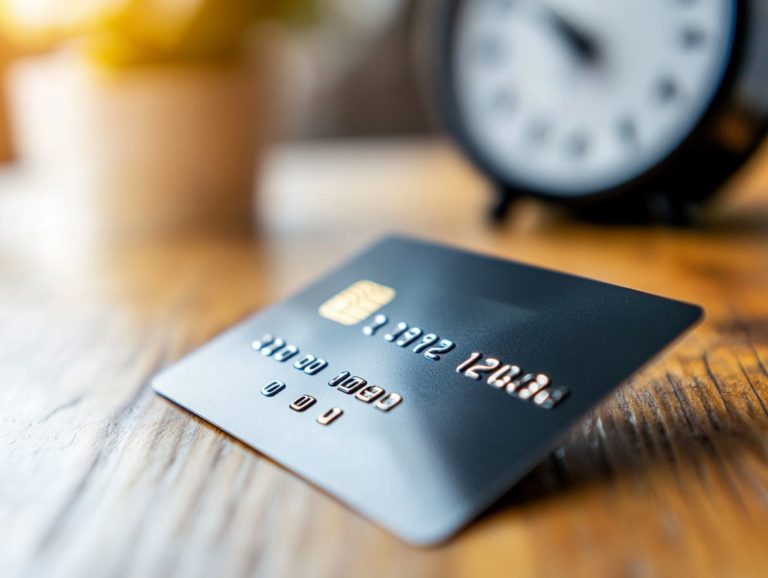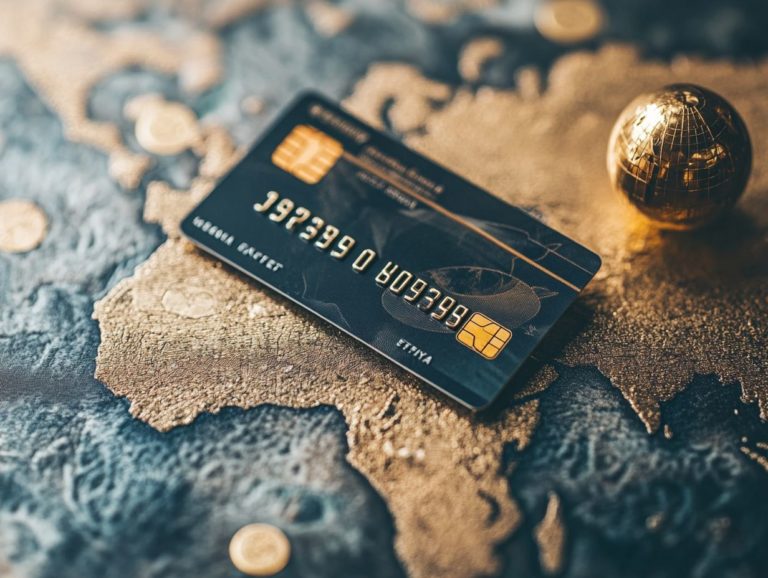How to Cancel a Credit Card Without Fees?
Canceling a credit card is a significant decision that many individuals encounter, whether it’s due to high fees, dissatisfaction with the service, or the desire to streamline your finances. If you’re thinking about canceling a credit card, act wisely! Understanding the impacts can save you money and stress.
Before you press that cancelation process, it s essential to grasp the implications of your choice particularly how it can influence your credit score.
This guide will walk you through the necessary steps for canceling a credit card, highlight common reasons for doing so, and offer tips on avoiding pesky cancellation fees.
Additionally, we ll delve into alternatives to cancellation that may align more closely with your financial goals.
Ready to navigate this process with confidence? Let s dive in!
Contents
- Key Takeaways:
- Understanding Credit Card Cancellation
- Reasons for Cancelling a Credit Card
- Steps to Cancel a Credit Card
- Avoiding Cancellation Fees
- Impact on Credit Score
- Alternatives to Canceling a Credit Card
- Frequently Asked Questions
- What is the best way to cancel a credit card without incurring any fees?
- Will I be charged for cancelling my credit card?
- Can I cancel my credit card online?
- Do I need to pay off my balance before cancelling my credit card?
- What should I do with my cancelled credit card?
- Can I reopen a cancelled credit card?
Key Takeaways:

- Understand the consequences of credit card cancellation and how it can affect your credit score.
- Gather all necessary information and negotiate with the credit card company to avoid cancellation fees.
- Explore alternatives for managing credit card debt and usage before deciding to cancel your credit card.
Understanding Credit Card Cancellation
Understanding credit card cancellation requires examining what happens when you close your credit card. You must consider how this action can influence your credit utilization rates and the ripple effects it may have on your credit history and score.
People often consider canceling their credit cards for reasons such as avoiding annual fees, managing existing credit card debt, or simply seeking to simplify their finances. It s essential for you to grasp the importance of your credit card issuer’s policies and the long-term implications for your credit profile before you make such a significant decision.
What Happens When You Cancel a Credit Card?
When you decide to cancel a credit card, several key factors come into play that could significantly impact your financial picture. You ll want to consider the immediate changes to your credit utilization, the potential effects on your credit history, and how all of this might influence your overall credit score.
Your credit utilization ratio, which is the ratio of your current credit card balances to your credit limits, can take a noticeable hit after canceling a card. This shift can result in a higher utilization percentage, especially if your other cards are carrying high balances.
Canceling a card might shorten your credit history, a critical element that lenders consider when evaluating your credit score. As a result, you may find that your options for future loans and interest rates could be affected, since lenders tend to favor applicants with strong credit scores. You can navigate these challenges by maintaining a balanced credit strategy that emphasizes timely payments and a healthy mix of credit types.
Reasons for Cancelling a Credit Card
You might find yourself considering the cancellation of a credit card for several reasons, such as high annual fees, disappointment with rewards programs, or a desire to manage credit card debt more effectively.
Many consumers assess the benefits of their credit card against the costs of maintaining it, and some even reach out for retention offers from their issuer when contemplating cancellation. By understanding these motivations, you can make informed decisions about your credit card options.
Common Motivations for Cancellation
Common motivations for canceling a credit card often revolve around the burden of credit card debt, high annual fees, and the desire to enhance overall credit utilization rates. When you find yourself weighed down by mounting debt, the idea of canceling a credit card can start to look quite appealing.
This sense of financial relief often becomes more pronounced as you weigh those high annual fees against the meager benefits you actually receive. For many, the goal of improving credit utilization keeping your balances low in relation to your credit limits further fuels the decision to cancel.
Take, for instance, a couple who noticed a significant drop in their debt-to-income ratio the amount of debt you have compared to your income after canceling an unused credit card. This change ultimately enabled them to secure a more favorable mortgage rate.
Statistics reveal that nearly 30% of Americans cite reduced fees as a primary reason for cancellation, underscoring that this is a widespread concern that resonates with many.
Steps to Cancel a Credit Card

To effectively cancel a credit card, follow these key steps:
- Pay off any outstanding balances. This sets a solid foundation for your cancellation.
- Review your credit card issuer’s cancellation policies. Understanding their requirements can help you avoid potential headaches.
- Formally notify them of your intent to close the account.
Each of these steps is crucial for ensuring a smooth cancellation process and minimizing any negative impact on your credit history.
By investing a bit of effort into understanding these steps, you can navigate the process with ease and avoid unwelcome surprises.
Gathering Necessary Information
Gathering the necessary information before canceling a credit card is essential. This includes reviewing your credit card balance and understanding your issuer’s policies.
Additionally, check for any outstanding rewards or benefits. Taking these steps ensures that you fully grasp any potential financial repercussions.
Confirming the remaining balance is vital to avoid any post-cancellation fees. Reviewing the issuer s terms regarding cancellations will help you sidestep surprises related to penalties or impacts on your credit score.
Don’t miss out on the value of any rewards points that might be lost upon cancellation. Redeeming those could offer more benefits than you initially realize.
Understanding these details gives you the power to make a well-informed decision about whether to proceed with canceling the card.
Notifying the Credit Card Company
Notifying your credit card company about your decision to cancel a card requires clear communication. Understanding the procedures set by your issuer is also essential.
Choose a communication method that suits you best, whether that’s a phone call, a secure message through their website, or a formal letter.
When you make the call, come prepared with your account details and any relevant information to streamline the process.
After expressing your intention to cancel, ask the representative to confirm your request. Request a reference number or written confirmation for your records. This documentation is crucial as it provides proof of your cancellation and can help you navigate potential disputes later.
Avoiding Cancellation Fees
You can avoid cancellation fees when deciding to terminate a credit card by effectively negotiating with your credit card issuer. Additionally, it’s helpful to know how to close a credit card account properly, as this may include exploring retention offers your issuer might provide and familiarizing yourself with your rights regarding annual fees.
This proactive approach not only empowers you but also helps you navigate the process with confidence and ease.
Tips for Negotiating with the Credit Card Company
- Approach the conversation with confidence. Clearly discuss your reasons for considering cancellation.
- Inquire about potential retention offers or the possibility of waiving those annual fees.
- Prepare before making that call. Gather information about your spending habits and any enticing offers from competing companies.
- When you engage with the representative, articulate your value as a long-term customer.
- Highlight your consistent payments and responsible usage to reinforce your case.
- Timing matters. Choose to call during off-peak hours for a better chance of reaching knowledgeable staff.
- Maintain a calm and polite demeanor to encourage the representative to assist you in securing the better terms you deserve.
With these tips in hand, you’re well-equipped to navigate the cancellation process effectively.
Impact on Credit Score

The impact of canceling a credit card on your credit score can be substantial. It can change your credit utilization, affect your credit history, and influence the overall health of your credit profile.
Grasping these effects is essential for anyone weighing the pros and cons of closing an account, especially when considering future credit opportunities.
How Canceling a Credit Card Can Affect Your Credit Score
Canceling a credit card can significantly impact your credit score. This is primarily due to shifts in how much credit you’re using compared to your total credit limit and changes in your credit history.
When you cancel a credit card, you re reducing your total available credit. This can skyrocket your credit utilization ratio if you carry balances on other cards. For instance, let s say your total credit limit is $10,000 and you owe $3,000 your utilization stands at a manageable 30%.
However, if you cancel a card with a $5,000 limit, your new total credit limit plummets to $5,000. This pushes your utilization ratio up to 60%. That s quite a leap and often leads to a drop in your credit score.
Statistics indicate that credit utilization plays a crucial role, influencing up to 30% of your credit score. Canceling a credit card can also affect the length of your credit history, as older accounts typically enhance your credit profile. Mastering these factors can empower you to enhance your credit situation!
Alternatives to Canceling a Credit Card
Before you make the decision to cancel a credit card, take a moment to explore several alternatives that might align more closely with your financial objectives.
Consider:
- Downgrading to a no-annual-fee card,
- Adding authorized users to share benefits, or
- Seeking effective strategies to manage your credit card debt.
These options could provide you with the flexibility and advantages you seek while maintaining your credit profile.
Options for Managing Credit Card Debt and Usage
Managing credit card debt and usage is within your grasp through effective strategies. Consider setting up recurring payments, paying off balances in full to avoid interest, and closely monitoring your credit utilization ratio.
By establishing a clear budget and meticulously tracking your expenses, you can gain valuable insights into your spending habits. This enables you to make informed decisions. Embracing tools like budgeting apps can significantly streamline this process.
Understanding and maintaining a low credit utilization ratio ideally below 30% is vital for preserving a healthy credit score. Regularly reviewing your statements will help you catch any unauthorized charges early. Adopting these disciplined habits promotes a proactive approach to your financial health.
This ultimately leads to reduced debt stress and enhanced creditworthiness.
Watch this video for more tips on managing credit cards!
Frequently Asked Questions
What is the best way to cancel a credit card without incurring any fees?

The best way to cancel a credit card without fees is to call your credit card company directly. Inform them of your decision to cancel, and to ensure you do it properly, you may want to learn how to cancel a credit card without hurting your score while negotiating any potential fees and finding out the exact steps to avoid them.
Will I be charged for cancelling my credit card?
Check with your credit card company; some charge fees while others don t. It s important to know their policies.
Can I cancel my credit card online?
It is typically not recommended to cancel a credit card online. It can be difficult to ensure all necessary steps have been taken to avoid fees. It is best to call your credit card company directly to cancel and confirm the cancellation in writing.
Do I need to pay off my balance before cancelling my credit card?
It is generally recommended to pay off your balance before cancelling a credit card. This may hurt your credit score.
Some credit card companies might let you cancel even if you still owe money, but confirm this with your issuer.
What should I do with my cancelled credit card?
After cancelling your card, make sure to cut it up and dispose of it properly. Also, keep an eye on your credit report to ensure the cancellation is reflected and there are no unauthorized charges.
Can I reopen a cancelled credit card?
In most cases, once you cancel a credit card, you can’t reopen it. You may need to reapply for a new card with the same company, so think carefully about what you want to do next.






